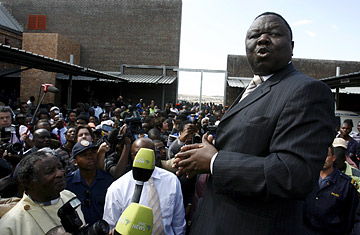
Morgan Tsvangirai, is greeted by Zimbabwe refugees effected by the recent xenophobia attacks in Alexandra Township while on a tour of the worst effected areas, in Johannesburg, South Africa, May 22, 2008.
For the past two weeks, Zimbabweans in South Africa have cowered in fear as xenophobic mobs have rampaged through townships splitting heads and burning flesh to send them a simple, ugly message: Go home. On Thursday, they heard the same message echoed from an unlikely quarter. Zimbabwean opposition leader Morgan Tsvangirai made a surprise visit to a police station in Alexandra township, where hundreds of his compatriots have sought refuge from the mobs, and urged them to follow him home. Tsvangirai is facing an increasingly violent political challenge at home, with supporters of President Robert Mugabe unleashing a campaign of intimidation against opposition supporters ahead of a runoff presidential election scheduled for June. Tsvangirai told the crowd he would return to Zimbabwe in the next few days, despite fears that he could be assassinated, and he invited the refugees of Alexandra to join him. "Let's go back home, let's solve the Zimbabwean problem," he told a jubilant crowd.
A couple of weeks ago, most of the Zimbabweans who'd managed to establish themselves here in Africa's richest economy might have scoffed at Tsvangirai's invitation. But amid ongoing violence against immigrants in different parts of the country — and the South African authorities resolved to deploy the military to restore order where necessary — areas such as Alexandra have been rapidly emptied of foreigners. For now, most of the 15,000 people displaced in the attacks have sought refuge in police stations, churches and community centers. (Though thousands more refugees have likely found their way to friends and families living in other areas.) But at these emergency shelters, many have begun talking of returning home to the impoverished and strife-ridden countries they fled.
Already about 10,000 people have opted to return home to Mozambique, an official from that government — which has laid on buses for would-be returnees — told Reuters. At the police station in Primrose east of Johannesburg, where about 5,000 people are camping in tents in an adjacent field, cheers erupted Wednesday as five buses arrived to take people back to Mozambique. On the opposite side of the field, 26-year old Mozambican Domingos Ubsse was sitting inside a minibus taxi, waiting to leave for Maputo. After 20 armed men barged into the room he shares with four others, breaking everything, he decided to leave: "My work is here, but I am going home because I don't feel safe here," he says.
Even Zimbabweans, who face not only poverty but also hunger and persecution in a country in economic and political free-fall, are choosing to return home rather than face more anti-immigrant violence in South Africa. In central Johannesburg on Thursday, a bus depot buzzed with scores of Zimbabweans desperate to get on buses bound for home. While these buses typically depart for Zimbabwe only half full, the past few days have seen them filled beyond capacity, says Victor Ramaphosa, an inspector with the Revival Bus Company.
Tinei Murimbechi managed to escape from the small convenience store he owned in Tembisa with just 250 rand ($35) — just enough to afford the bus fare back to his home near Bulawayo — before a crowd of South Africans brandishing fighting sticks and spears looted it, singing "Out with foreigners." Before he fled, he says he watched the mob kill three men: one of them was shot and the other two bludgeoned.
Running his small store in Tembisa, east of Johannesburg, had enabled Murimbechi to support three younger siblings back in Zimbabwe, he says. "Maybe I will come back here," he adds desolately. "Or maybe Morgan Tsvangirai will win the election, and maybe the economic situation will improve." About a dozen other Zimbabweans at the bus depot shared similar stories with TIME, while others seeking shelter in the Central Methodist Church in downtown Johannesburg — where around 3,000 mainly Zimbabweans are have found a makeshift refuge — said that they would return home if they could afford to.
Meanwhile, in the squatter camp of Ramaphosa east of Johannesburg, scavengers sifted through the charred wreckage where foreigners' shacks once stood, carting away sheets of twisted and blackened metal. One neighbor stepped out of his shack to claim that the Mozambicans chased out two days ago had provoked the attacks by planning revenge attacks on South Africans after hearing of the violence in Alexandra. "They want to rule here in South Africa," said the man, who declined to give his name.
A few meters away, two South African men sit guarding their own shacks from looting by their countrymen. One says he has stayed away from his job as a mechanic for two days in order to protect his property. "I'm afraid to sleep here," says one of the men who only gives his first name, Alpheu. "These foreigners can come in the night to kill us." When the anti-immigrant mobs began their rampage, he says, they pounded on his door, saying, "Why are you sleeping?" and demanding that he join them. But he refused. "They are still our brothers," he says.
As the men talk, the retreating form of an older man in a gray coat walking hastily down the road in the direction of the police station catches their eye. "He's a Shangaan," explains the other man, who gives his name as Sidney. (Shangaans are a South African ethnic group also found in Mozambique, and a number of them have been victimized during the anti-immigrant violence.) "Maybe he was going to see if he could rescue some of his stuff. If they see him here, they can kill him now. You can see he's afraid."
